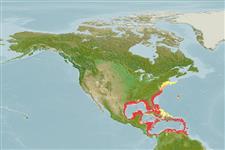>
Eupercaria/misc (Various families in series Eupercaria) >
Lutjanidae (Snappers) > Lutjaninae
Etymology: Lutjanus: Malay, ikan lutjan, name of a fish.
More on author: Linnaeus.
Environment: milieu / climate zone / depth range / distribution range
экология
морской; пресноводный; солоноватоводный ассоциированный с рифами; амфидромный (Ref. 55); пределы глубины 5 - 180 m (Ref. 55), usually ? - 50 m (Ref. 9626). Subtropical; 42°N - 9°N, 98°W - 59°W (Ref. 55231)
Western Atlantic: Massachusetts south along U.S. coast, Bermuda, the Bahamas, and throughout the Gulf of Mexico and Caribbean Sea. Records from Brazil are based on misidentifications (Ref. 113893). Records from the eastern Atlantic are vagrants (Ref. 10795).
Length at first maturity / Size / Вес / Возраст
Maturity: Lm 32.0, range 21 - ? cm
Max length : 89.0 cm TL самец/пол неопределен; (Ref. 55); common length : 40.0 cm TL самец/пол неопределен; (Ref. 55); наибольший вес (опубликованные данные): 20.0 kg (Ref. 4883); наибольший возраст (опубликованны данные): 21 годы (Ref. 55)
колючие лучи спинного плавника (общее число) : 10; членистые (мягкие) лучи спинного плавника (общее число) : 13 - 14; колючие лучи анального плавника: 3; членистые (мягкие) лучи анального плавника: 7 - 8. Dorsal profile of head slightly concave, snout long and pointed. Preopercular notch and knob weak. Scale rows on back parallel to lateral line anteriorly, but rising obliquely posteriorly, below soft part of dorsal fin. Young specimens with a dark stripe from snout through the eye to upper opercle and a blue stripe on cheek below eye.
Adults inhabit coastal as well as offshore waters around coral reefs, rocky areas, estuaries, mangrove areas, and sometimes in lower reaches of rivers (especially the young). They are found in fresh water in Florida (Ref. 26938). Often forming large aggregations. Feed mainly at night on small fishes, shrimps, crabs, gastropods, cephalopods and some planktonic items. Easily approached (Ref. 9710). Good food fish (Ref. 9626). Utilized fresh and frozen; eaten pan-fried, broiled, microwaved, and baked (Ref. 9987). Has been reared in captivity (Ref. 35420).
Spawning occurs in summer near the time of the full moon.
Allen, G.R., 1985. FAO Species Catalogue. Vol. 6. Snappers of the world. An annotated and illustrated catalogue of lutjanid species known to date. FAO Fish. Synop. 125(6):208 p. Rome: FAO. (Ref. 55)
Статус Красного Списка МСОП (Ref. 130435)
Угроза для людей
Reports of ciguatera poisoning (Ref. 31172)
Использование человеком
рыболовство: коммерческий; объект спортивного рыболовства: да; аквариум: коммерческий
дополнительная информация
инструменты
Специальные отчеты
Скачать в формате XML
ресурсы в Интернет
Estimates based on models
Preferred temperature (Ref.
123201): 20 - 27.5, mean 24.8 °C (based on 137 cells).
Phylogenetic diversity index (Ref.
82804): PD
50 = 0.5000 [Uniqueness, from 0.5 = low to 2.0 = high].
Bayesian length-weight: a=0.01479 (0.01302 - 0.01681), b=2.97 (2.95 - 2.99), in cm total length, based on LWR estimates for this species (Ref.
93245).
Trophic level (Ref.
69278): 4.2 ±0.3 se; based on diet studies.
Generation time: 6.6 (4.8 - 8.8) years. Estimated as median ln(3)/K based on 10
growth studies.
устойчивость к внешним воздействиям (Ref.
120179): средний (среднего размера), минимальное время удвоения популяции 1.4-4.4 года (K=0.10; tm=2-3; tmax=21).
Prior r = 0.31, 95% CL = 0.20 - 0.46, Based on 1 full stock assessment.
Fishing Vulnerability (Ref.
59153): Moderate vulnerability (41 of 100).
Nutrients (Ref.
124155): Calcium = 14.7 [8.0, 24.0] mg/100g; Iron = 0.307 [0.183, 0.560] mg/100g; Protein = 19.5 [18.0, 20.8] %; Omega3 = 0.222 [0.132, 0.370] g/100g; Selenium = 36.3 [18.3, 68.1] μg/100g; VitaminA = 92.6 [15.6, 438.0] μg/100g; Zinc = 0.255 [0.181, 0.390] mg/100g (wet weight);
